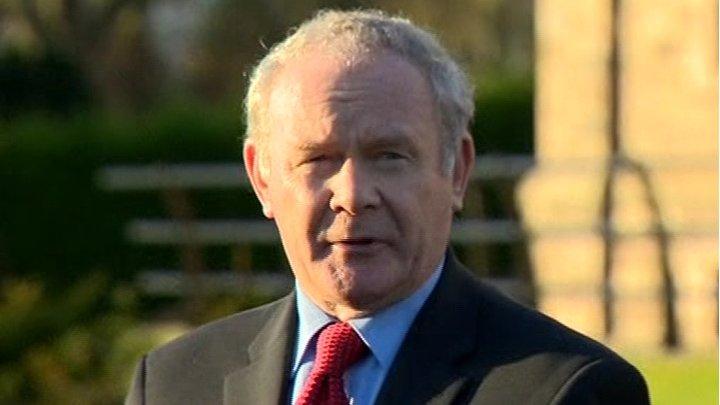Martin McGuinness: Vigils held for Sinn Féin leader
- Published
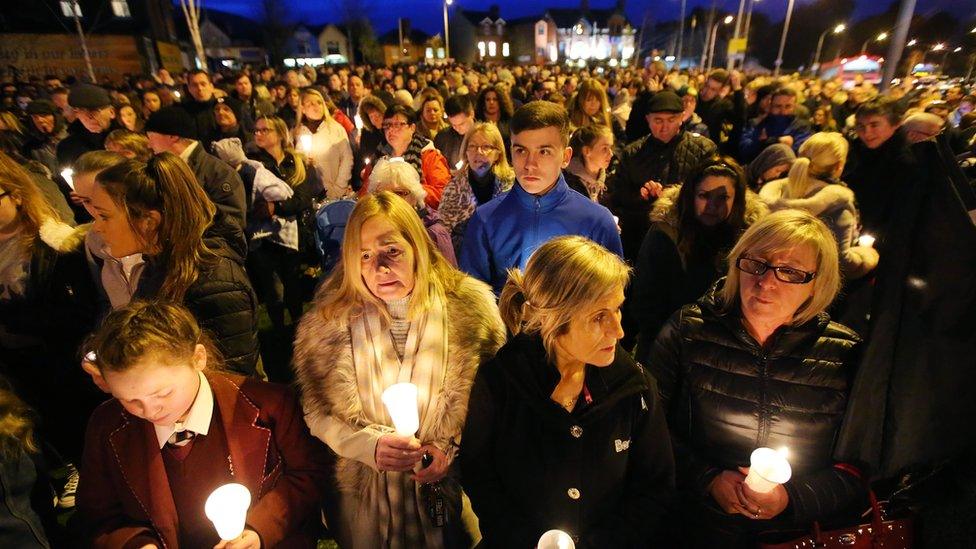
Crowds gathered to pay tribute to Martin McGuinness in west Belfast
Vigils have been held across the island of Ireland for Sinn Féin's Martin McGuinness, who has died aged 66.
His body was returned to his Derry home on Tuesday afternoon.

Senior Sinn Féin members, including leader Gerry Adams, carry Mr McGuinness' coffin
Hundreds of people accompanied the coffin, draped with an Irish tricolour, as it was carried through the Bogside area.
The ex-IRA leader turned politician died in Altnagelvin Hospital overnight aged 66. It is understood he had been suffering from a rare heart condition.
His death prompted the Northern Ireland Assembly to be recalled on Wednesday. The funeral will be in Londonderry on Thursday.

The coffin was carried through the Bogside to Mr McGuinness' family home
Vigils took place in Northern Ireland and in the Republic of Ireland on Tuesday night to mark the former deputy first minister's death.
One, on the Andersonstown Road in west Belfast, attracted hundreds of people.

Hundreds gathered at a vigil for Martin McGuinness in west Belfast on Tuesday night
It took place on the site of the former Andersonstown Road police station.
Some of those gathered were holding candles and sang songs while others watched on.
Father Gary Donegan offered prayers and told the crowd how he had "anointed and blessed" Mr McGuinness "weeks ago".

Former Ardoyne priest Father Gary Donegan offered prayers at the vigil in Andersonstown
Another vigil was held near the General Post Office headquarters in Dublin city centre, in the Republic of Ireland.
Similar events were held in Galway, in the Republic of Ireland, and Dungiven in County Londonderry.
The Queen is sending a private message to Mr McGuinness' widow, Buckingham Palace confirmed.

Crowds gather in Dublin to pay tribute to Martin McGuinness
The flag above Leinster House, which houses the Irish parliament, will be flown at half mast on the day of Mr McGuinness' funeral.
Among the seismic moments in his time in government was the famous handshake with the Queen in 2012 and a toast to her Majesty at Windsor Castle.
A look back at the life of Martin McGuinness
Politicians and others have been giving their reaction to Mr McGuinness' death, as have those who lost loved ones or were injured in the IRA campaign.
Colin Parry, whose 12-year-old son, Tim, died in an IRA bomb in Warrington in 1993, said that although he did not forgive the IRA or Martin McGuinness, he found him a man who was "sincere in his desire for peace".
Sinn Féin president Gerry Adams said: "Throughout his life Martin showed great determination, dignity and humility and it was no different during his short illness.
The Queen shook hands with Martin McGuinness in 2012
Prime Minister Theresa May said although she could never "condone the path he took in the earlier part of his life, Martin McGuinness ultimately played a defining role in leading the republican movement away from violence".
"In doing so, he made an essential and historic contribution to the extraordinary journey of Northern Ireland from conflict to peace," she added.
Colin Parry's 12-year-old son was killed by an IRA bomb - but he says he liked Martin McGuinness
Mr McGuinness became deputy first minister in 2007, standing alongside Democratic Unionist Party leaders Ian Paisley, Peter Robinson and Arlene Foster.
A visibly ailing Mr McGuinness stood down from his post in January to protest against the DUP's handling of an energy scandal, in a move that triggered a snap election.

Analysis: BBC News NI Home Affairs Correspondent Vincent Kearney
No-one knows how many people Martin McGuinness killed, directly or indirectly.
As a senior commander in the Provisional IRA for many years, there is no doubt there was blood on his hands.
Security sources say he went on to become chief of staff of the organisation from the early 1980s, right through until the end of the IRA's campaign of violence.
Nothing happened in Derry without him knowing.
Read more here:

Former Conservative cabinet minister Lord Tebbit, who was injured and whose wife was paralysed by an IRA bomb in Brighton's Grand Hotel in 1984, described Mr McGuinness as "a coward".
"The reason he suddenly became a man of peace, was that he was desperately afraid that he was going to be arrested and charged with a number of murders," he said.
Lord Tebbit said Martin McGuinness was "a coward, a murderer"
Taoiseach (Irish prime minister) Enda Kenny said Mr McGuinness' death represented a "significant loss, not only to politics in Northern Ireland, but to the wider political landscape on this island and beyond".
Mr Kenny will attend Mr McGuinness' funeral as will Irish President Michael D Higgins.
DUP MP Nigel Dodds, who survived an IRA gun attack in Belfast in 1996 as he was visiting his sick child in hospital, said: "We can't forget his past.... This will also be a difficult day for victims. But he did help move people forward when it comes to the peace process."
Martin McGuinness, from paramilitary to politician
Born in 1950, Martin McGuinness grew up in Derry's Bogside, radicalised, he said, by discrimination and murder on the streets of his city.
He had a leading role in the IRA during a time when the paramilitary organisation was bombing his home city.
Tony Blair tells BBC's Today programme what made Martin McGuinness formidable foe also made him formidable peacemaker
The shift to politics came slowly: Mr McGuinness was chief negotiator in the blossoming peace process and took on the post of education minister.
By 2007, he was Northern Ireland's deputy first minister standing alongside First Minister Ian Paisley. The two forged an unlikely alliance - but they were working together for the same goal.

Hundreds of people accompanied the coffin, draped in the Irish flag, as it was carried through the Bogside area
He worked alongside DUP first minister Peter Robinson and, until January, was in office with Arlene Foster.
In recent years, he said: "My war is over. My job as a political leader is to prevent that war and I feel very passionate about it."
His funeral cortege will leave his home on Thursday at 13:20 GMT ahead of Requiem Mass at St Columba's Church Longtower at 14:00. He will be buried in the City Cemetery.
- Published21 March 2017
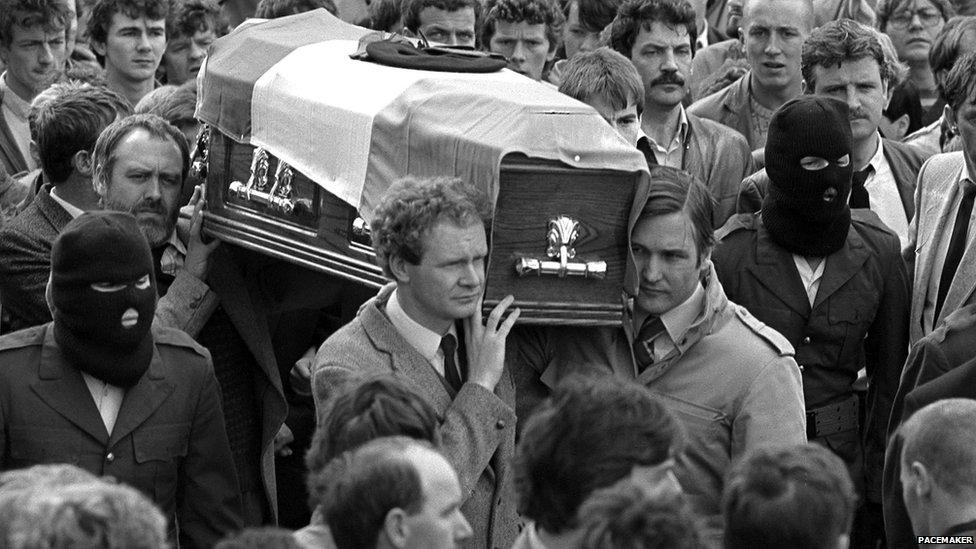
- Published21 March 2017
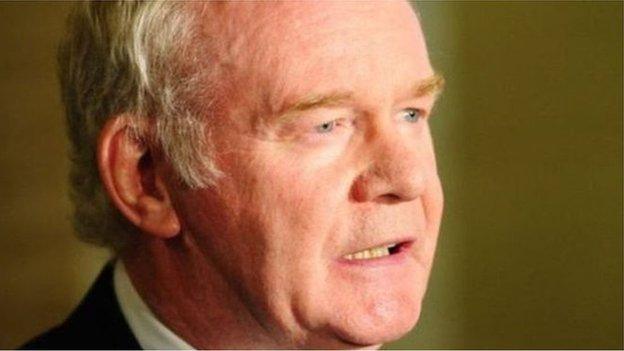
- Published21 March 2017
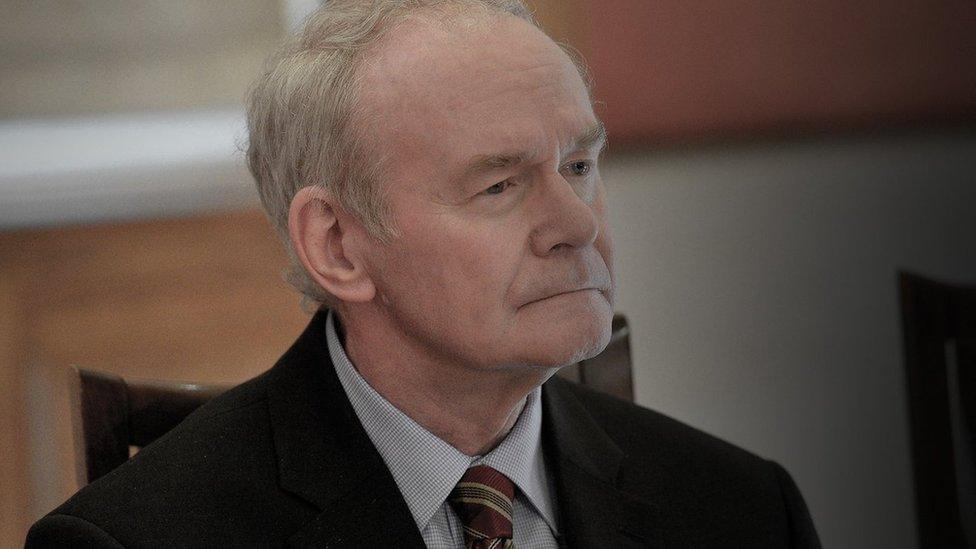
- Published21 March 2017
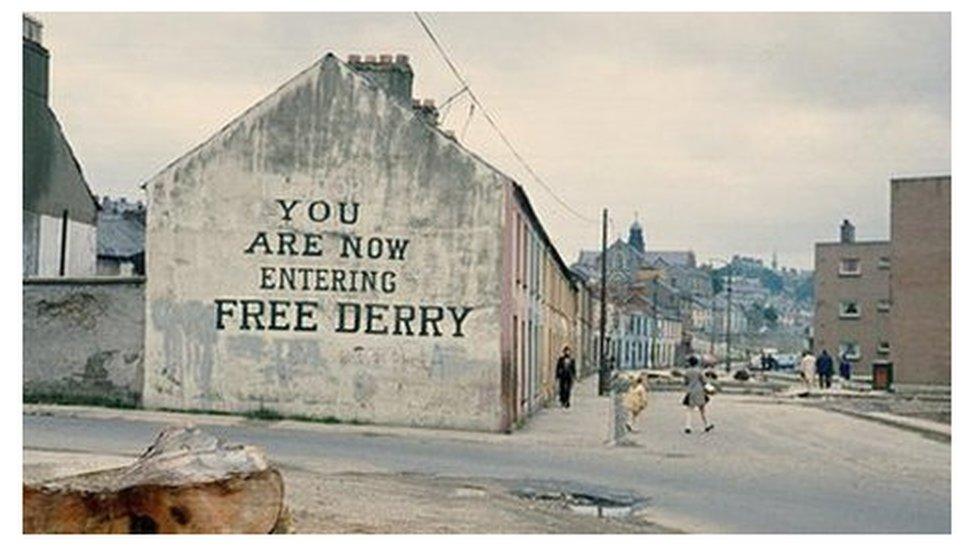
- Published21 March 2017
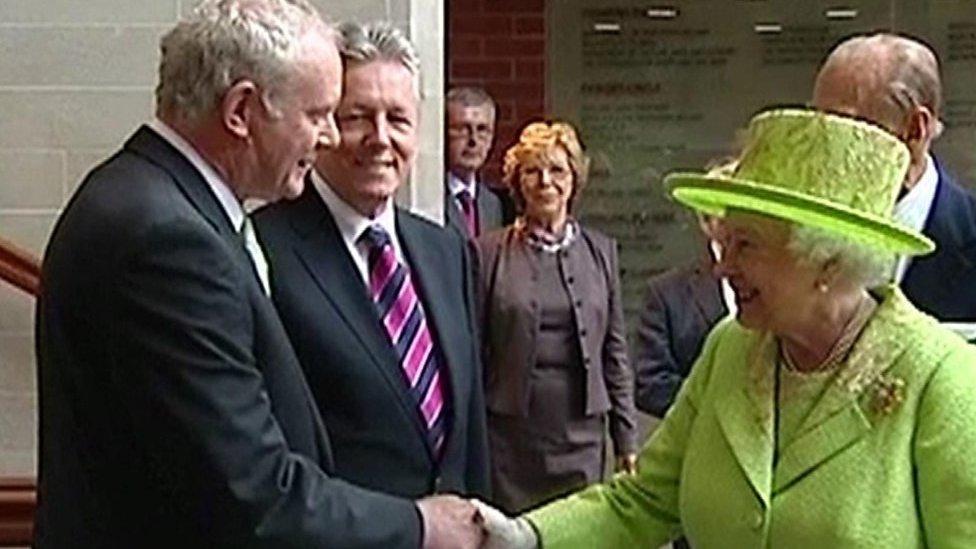
- Published21 March 2017

- Published21 March 2017
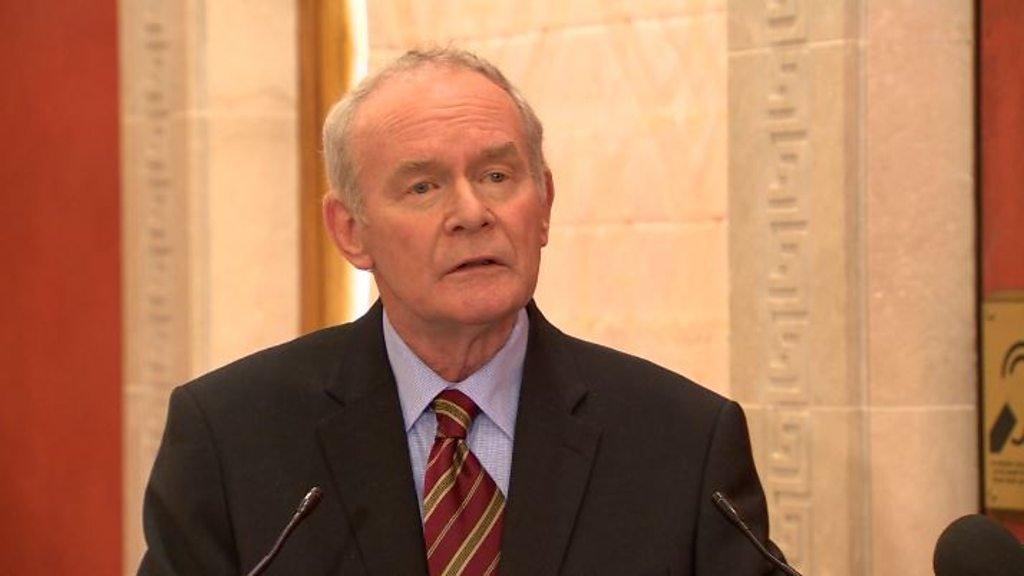
- Published21 March 2017
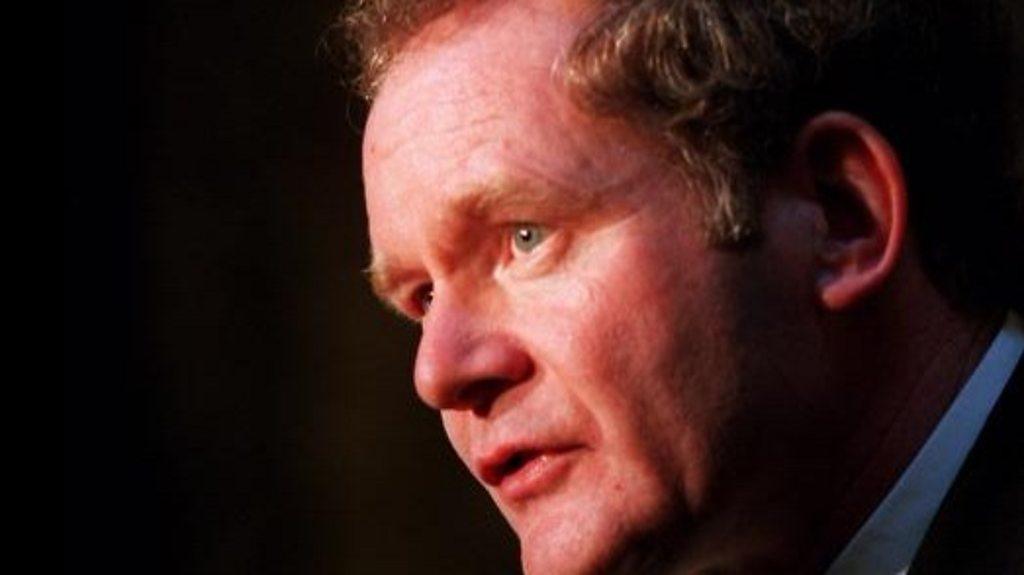
- Published21 March 2017
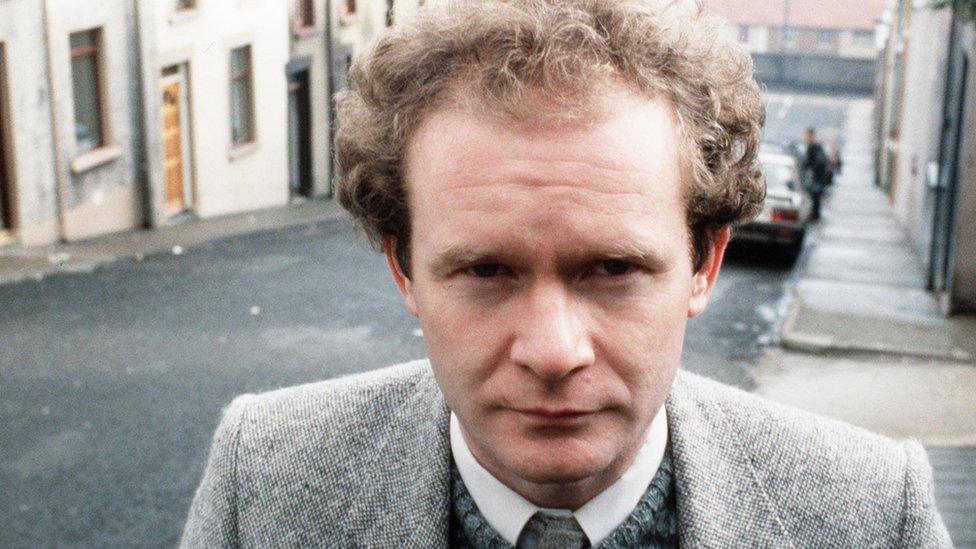
- Published21 March 2017
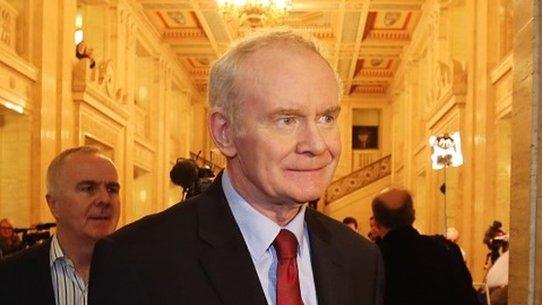
- Published20 January 2017
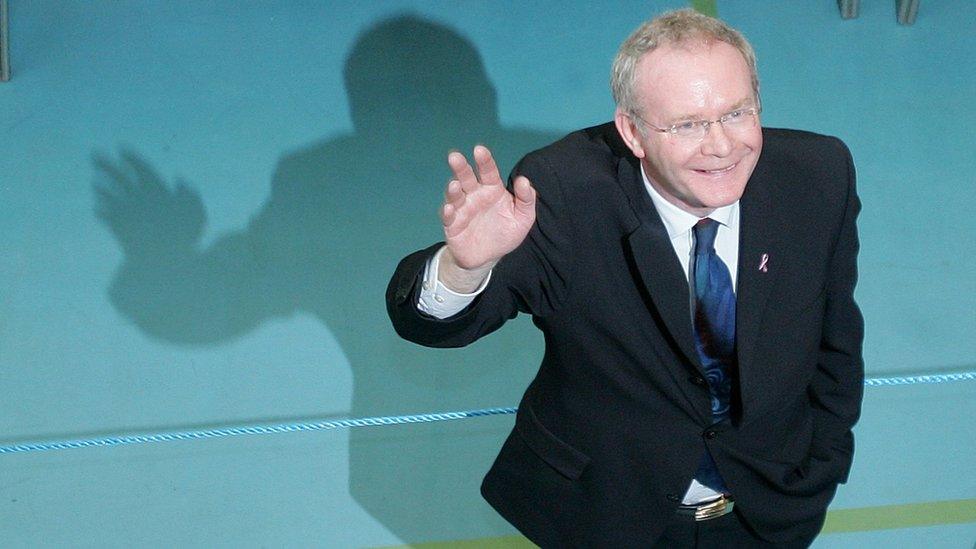
- Published27 June 2012
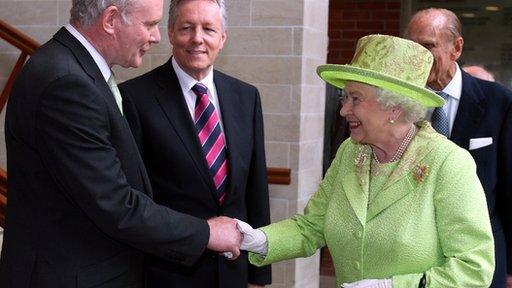
- Published7 March 2017
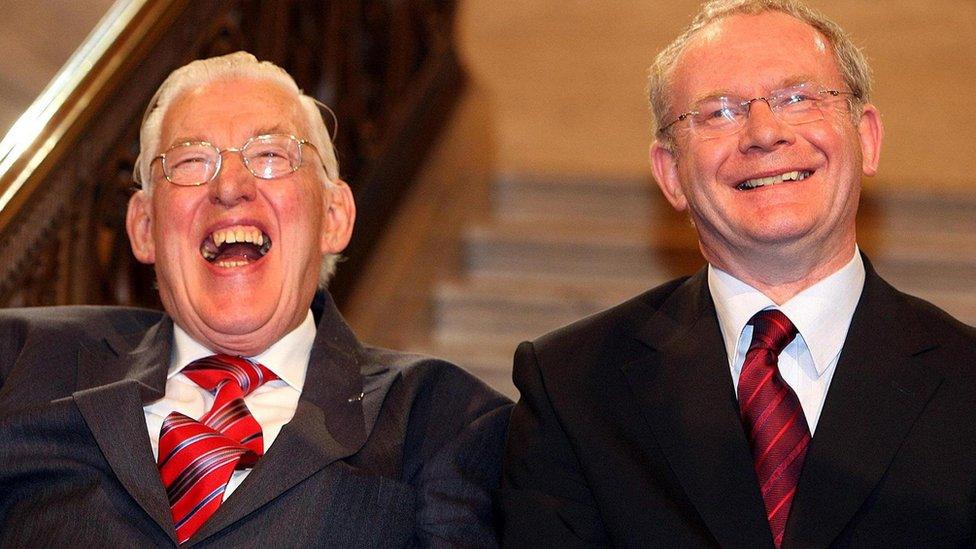
- Published22 June 2012
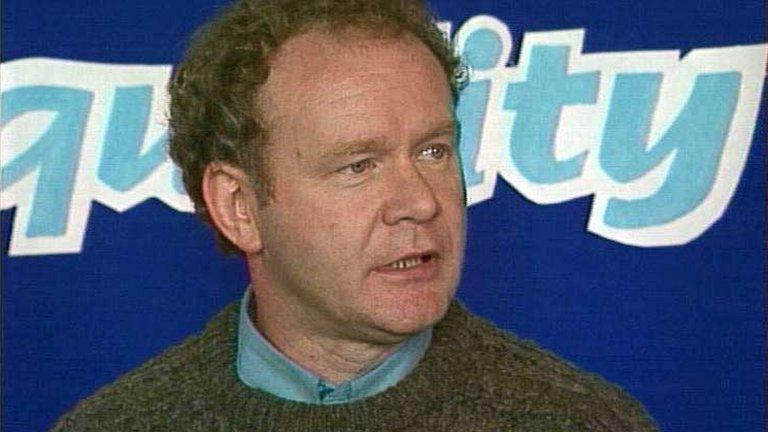
- Published26 September 2014
